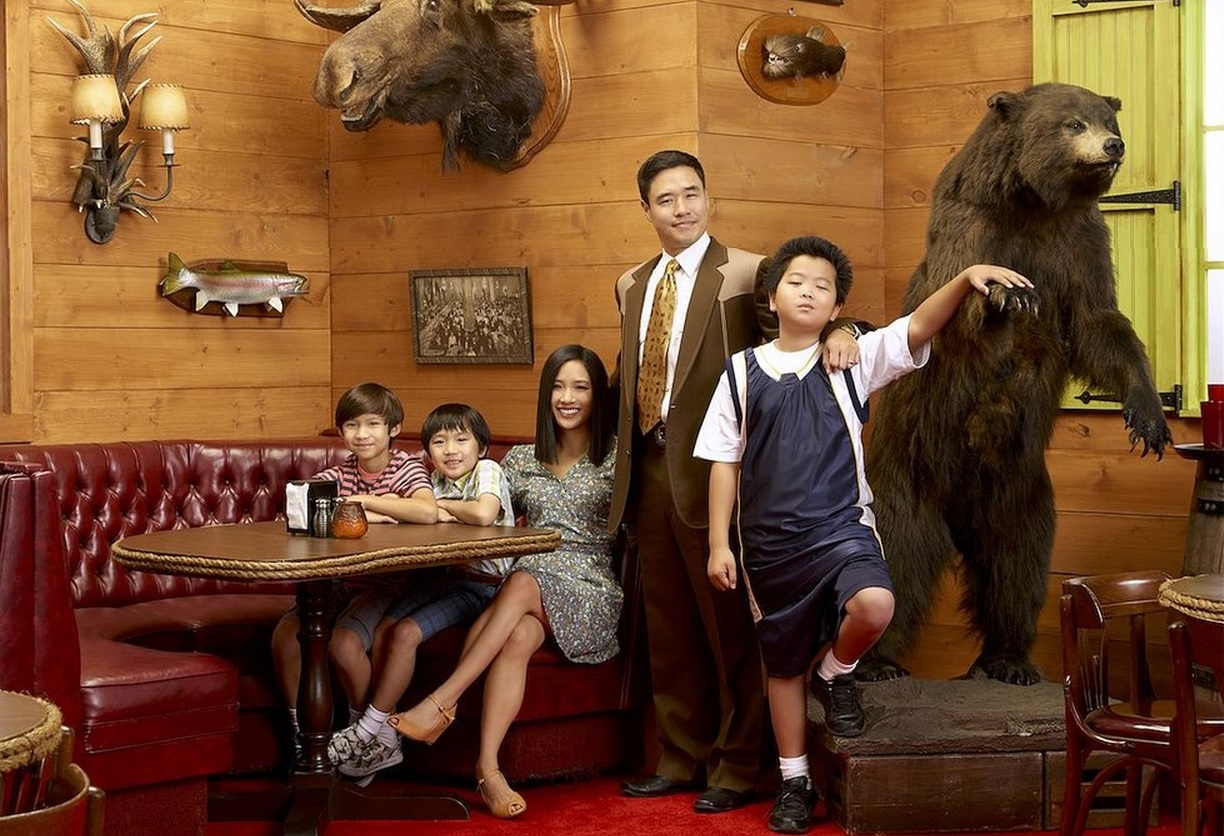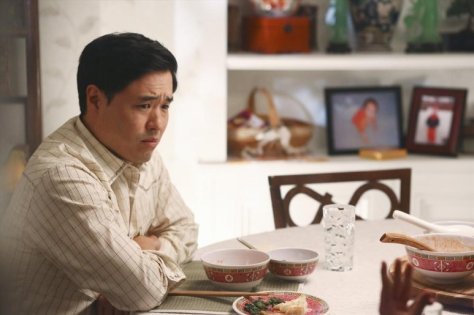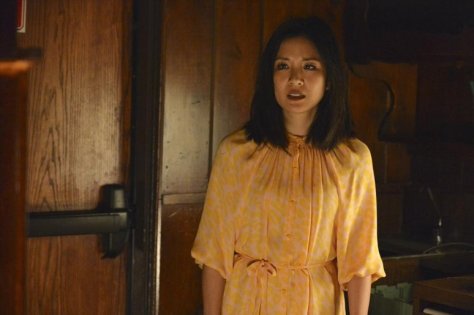Synopsis (ABC): It’s the 90s and 12 year old, hip-hop loving Eddie (Hudson Yang) just moved to suburban Orlando from DC’s Chinatown with his parents (Randall Park and Constance Wu). It’s culture shock for his immigrant family in this comedy about pursuing the American Dream. “Fresh Off the Boat” is based on Chef Eddie Huang’s memoir Fresh Off the Boat.
“Fresh Off the Boat” is executive produced and written by Nahnatchka Kahn and executive produced by Jake Kasdan.
Starring: Hudson Yang (Eddie), Randall Park (Louis), Constance Wu (Jessica), Forrest Wheeler (Emery) and Ian Chen (Evan)
My opinions: First of all, I’m not Asian. I think if you follow me on Twitter and have seen my picture on this website, this fact will be apparent. Therefore, this review is coming from the viewpoint of a person who is outside of the Asian American Experience.
I wrote that first because I think where Fresh Off the Boat excels the best is that it’s literally telling us a side of American life that most everyone in America who isn’t Asian don’t know about. Every minority in America has a cross-section of similar live experiences—being ostracized for identifying as too “American” (i.e. “white”), repping one’s culture while somehow making it up the ladder in a white-dominated society, being discriminated against or facing racism, etc. Yet, there are may other things that are unique to the Asian American experience that no one has seen on television, even though the Asian American voice is what’s needed on television to balance out the stories being told.
When I viewed the episode, I was learning about an America that even I, a black American, am not familiar with. Unique parts of Eddie Huang’s life, such was being called a derogatory term by a black boy, is what makes the show so powerful to me. America’s used to black people complaining about the cultural and racial hierarchy. But seeing Eddie be caught in the middle of the hierarchy and society itself giving him no identity of his own was fascinating.
His mother didn’t want him to “make waves,” which seems to reference some of the parental advice I’ve heard Asian Americans speak about, but to get by, he has to become more “American,” which means buying Lunchables instead of eating the Chinese lunches his mother makes him. However, when he thinks he’s finally gotten a leg up, the black kid brings up the fact that even though black and Asian people are at the lower rungs of society, the black kid isn’t about to let Eddie think he’s going to become one of the white people. The white people also won’t let him become one of them because of his mom’s Chinese lunches, which they think are “smelly” and look like “worms.”
The biggest twist in this whole thing is that while the white kids’ response is expected by the audience, the black kid’s decision to degrade Eddie was probably seen as surprising. Some black people say that black people can’t be racist. Newsflash—yes, they can. This boy is proof of that. It’s society’s fault. The black kid, I know, has been taught by his parents that 1) America doesn’t care about black people and 2) the erroneous idea that Asian Americans don’t care about black people, even though they’re just as discriminated against as black families. I know this is what that boy’s coming from because I’ve heard this from people in my own life.
The boy is coming from the “I’ll get you before you get me” idea, which is only supported by America’s racial system. Everyone wants to live the American dream, but as it’s been for decades, only white people were allowed to actually achieve every aspect of the dream. Everyone else is left to claw at each other and repeat the racial stereotypes taught to them by the society, the same stereotypes that have been used to demean them. Hundreds of years of this have led to Eddie being called a name by a black boy. Congratulations, America.
I’m sure as the season goes along, Eddie will have his own problems when it comes to his identity, what with him identifying more with black culture than it would seem his parents, especially his mom, are comfortable with. His mom wondering why he’s always wearing black rappers on his shirts and his dad calling Eddie’s rap music collection “dirty music” once again goes back to the sniping other minorities do at each other, thinking one minority is worse than the other. But it also goes towards the worry about keeping cultural identity. I was taken back to my own childhood at certain points in this episode.
My family is weird in that we take pleasure in making off-color racial jokes about one another. We’ve always joked that my sisters and brother and I are “clear” in terms of blackness, a play on the idea that one has to be a certain level of “blackness” to be really black. My affinity for pan-Asian cultures, my sister’s love of Bollywood, and my youngest sister’s love for anime doesn’t help us the battle against “clearness”.
But Eddie’s mom’s concern about Eddie always wearing black people on his shirts reminded me of my own mother’s concern about us playing with white dolls. She was so concerned that we never did play with white dolls; we played with black dolls and dolls of other minorities, never white. Therefore, we learned to appreciate our culture and the cultures of others instead of learning to uplift the Eurocentric idea of beauty.
However, Eddie’s mom, in 1995 and in a still mostly-white Orlando, didn’t have the opportunity my mom did. There were not only black dolls I could look to, but there were role models like Oprah, Tyra Banks, RuPaul, the Wayans, Will Smith, and so on and so forth. I could go on forever naming powerful black people in the ’90s. Yeah, there’s Jackie Chan and Bruce Lee, but who else was there? What images were there in which Eddie could see himself? The main reason Eddie turned to hip hop was because, as he said in the pilot, it told the minority’s struggle. This is how Eddie cultivated his perspective on life.
So what am I saying? To make it short, this show is going to go a long way in telling an untold story that is just as layered and enlightening as it is entertaining. Just like I wrote up top, there’s always a cross-section of similar experiences between minorities, but every minority group has experiences that are unique to only them, and these experiences should be told.
Unfortunately, Fresh Off the Boat is going to be up against a lot of scrutiny, particularly from Asian Americans themselves. Just like when there were only one to two black shows on television decades ago and black people were analyzing if the show’s characters really represented the whole scope of the black experience, there will be some Asian viewers who will not think Fresh Off the Boat represents them and that’s cool. The Cosby Show doesn’t really represent me. But at the very least, Fresh Off the Boat is paving the road towards more shows like it. Hopefully, there will be more shows detailing the varied experiences of Asian Americans on every network.
What did you think of Fresh Off the Boat? Give your opinions in the comments section below!
Photo credit: Bob D’Amico, Michael Ansell, Eric McCandless/ABC





